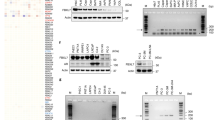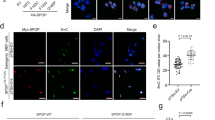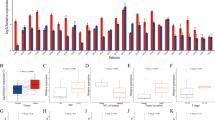Abstract
Introduction:
p21WAF1/CIP1 may act as a tumour suppressor gene (TSG) and loss of the p21WAF1/CIP1 gene has been reported in several solid tumours. The aim of this study was to see whether p21WAF1/CIP1 was expressed in metastatic prostate cancer cell lines and to determine if there was methylation of the p21WAF1/CIP1 promoter.
Method:
PC3, LNCaP and DU145 metastatic prostate cancer cell lines, 1542NP normal prostate, and RD rhabdomyosarcoma cell lines were cultured in the demethylating agent 5-Aza-2 deoxycytidine (5-Aza-CdR). p21WAF1/CIP1 mRNA expression was analysed by RT-PCR. DNA from untreated cell lines was modified with sodium bisulphite and promoter sequencing was performed.
Results:
p21WAF1/CIP1 was expressed at low or undetectable levels in metastatic prostate cancer cell lines but expression was reactivated by treatment with 5-Aza-CdR. Sequence analysis of the promoter region revealed several sites of methylation at the 5′ end of a CpG island in the PC3, LNCaP and DU145 cell line DNA but not in the normal prostate control DNA. Most notably the Sis-inducible element (SEI)-1—a STAT1-binding site, was methylated.
Conclusions:
In this study, we show that p21WAF1/CIP1 expression in metastatic prostate cancer cell lines is enhanced as a result of demethylation of the DNA. Furthermore, several cytosine residues in the promoter region are methylated, including critical binding sites. The inhibition of the STAT1-signalling pathway by methylation of the promoter may inactivate the p21WAF1/CIP1 TSG in prostate cancer.
This is a preview of subscription content, access via your institution
Access options
Subscribe to this journal
Receive 4 print issues and online access
$259.00 per year
only $64.75 per issue
Buy this article
- Purchase on Springer Link
- Instant access to full article PDF
Prices may be subject to local taxes which are calculated during checkout




Similar content being viewed by others
References
el Deiry WS et al. WAF1, a potential mediator of p53 tumor suppression. Cell 1993; 75: 817–825.
Harper JW et al. The p21 Cdk-interacting protein Cip1 is a potent inhibitor of G1 cyclin-dependent kinases. Cell 1993; 75: 805–816.
Datto MB et al. Transforming growth factor beta induces the cyclin-dependent kinase inhibitor p21 through a p53-independent mechanism. Proc Natl Acad Sci USA 1995; 92: 5545–5549.
Chin YE et al. Activation of the STAT signaling pathway can cause expression of caspase 1 and apoptosis. Mol Cell Biol 1997; 17: 5328–5337.
Xu X, Fu XY, Plate J, Chong AS . IFN-gamma induces cell growth inhibition by Fas-mediated apoptosis: requirement of STAT1 protein for up-regulation of Fas and FasL expression. Cancer Res 1998; 58: 2832–2837.
Gartel AL, Tyner AL . Transcriptional regulation of the p21((WAF1/CIP1)) gene. Exp Cell Res 1999; 246: 280–289.
Bellido T, O’Brien CA, Roberson PK, Manolagas SC . Transcriptional activation of the p21(WAF1,CIP1,SDI1) gene by interleukin-6 type cytokines. A prerequisite for their pro-differentiating and anti-apoptotic effects on human osteoblastic cells. J Biol Chem 1998; 273: 21137–21144.
Chin YE et al. Cell growth arrest and induction of cyclin-dependent kinase inhibitor p21 WAF1/CIP1 mediated by STAT1. Science 1996; 272: 719–722.
Li R et al. Differential effects by the p21 CDK inhibitor on PCNA-dependent DNA replication and repair. Nature 1994; 371: 534–537.
Chen J, Jackson PK, Kirschner MW, Dutta A . Separate domains of p21 involved in the inhibition of Cdk kinase and PCNA. Nature 1995; 374: 386–388.
Dotto GP . p21(WAF1/Cip1): more than a break to the cell cycle? Biochim Biophys Acta 2000; 1471: M43–M56.
Hirama T, Koeffler HP . Role of the cyclin-dependent kinase inhibitors in the development of cancer. Blood 1995; 86: 841–854.
Toyoshima H, Hunter T . p27, a novel inhibitor of G1 cyclin-Cdk protein kinase activity, is related to p21. Cell 1994; 78: 67–74.
DiGiuseppe JA et al. p53-independent expression of the cyclin-dependent kinase inhibitor p21 in pancreatic carcinoma. Am J Pathol 1995; 147: 884–888.
Noda H et al. Growth pattern and expressions of cell cycle regulator proteins p53 and p21WAF1/CIP1 in early gastric carcinoma. Cancer 2001; 92: 1828–1835.
Shariat SF et al. p53, p21, pRB, and p16 expression predict clinical outcome in cystectomy with bladder cancer. J Clin Oncol 2004; 22: 1014–1024.
Shoji T et al. Clinical significance of p21 expression in non-small-cell lung cancer. J Clin Oncol 2002; 20: 3865–3871.
Cheng L et al. The cell cycle inhibitors p21WAF1 and p27KIP1 are associated with survival in patients treated by salvage prostatectomy after radiation therapy. Clin Cancer Res 2000; 6: 1896–1899.
Matsushima H et al. Immunohistochemical study of p21WAF1 and p53 proteins in prostatic cancer and their prognostic significance. Hum Pathol 1998; 29: 778–783.
Shiohara M et al. Absence of WAF1 mutations in a variety of human malignancies. Blood 1994; 84: 3781–3784.
Roman-Gomez J et al. 5′ CpG island hypermethylation is associated with transcriptional silencing of the p21(CIP1/WAF1/SDI1) gene and confers poor prognosis in acute lymphoblastic leukemia. Blood 2002; 99: 2291–2296.
Strathdee G, Brown R . Aberrant DNA methylation in cancer: potential clinical interventions. Exp Rev Mol Med 2002. http://www-ermm.cbcu.cam.ac.uk/02004222a.pdf.
Chen B et al. Inhibition of the interferon-gamma/signal transducers and activators of transcription (STAT) pathway by hypermethylation at a STAT-binding site in the p21WAF1 promoter region. Cancer Res 2000; 60: 3290–3298.
Sherr CJ, Roberts JM . CDK inhibitors: positive and negative regulators of G1-phase progression. Genes Dev 1999; 13: 1501–1512.
Chan FK et al. Identification of human and mouse p19, a novel CDK4 and CDK6 inhibitor with homology to p16ink4. Mol Cell Biol 1995; 15: 2682–2688.
Serrano M, Hannon GJ, Beach D . A new regulatory motif in cell-cycle control causing specific inhibition of cyclin D/CDK4. Nature 1993; 366: 704–707.
Hirai H et al. Novel INK4 proteins, p19 and p18, are specific inhibitors of the cyclin D-dependent kinases CDK4 and CDK6. Mol Cell Biol 1995; 15: 2672–2681.
Matsuoka S et al. p57KIP2, a structurally distinct member of the p21CIP1 Cdk inhibitor family, is a candidate tumor suppressor gene. Genes Dev 1995; 9: 650–662.
Kibel AS et al. Identification of 12p as a region of frequent deletion in advanced prostate cancer. Cancer Res 1998; 58: 5652–5655.
Guo Y, Sklar GN, Borkowski A, Kyprianou N . Loss of the cyclin-dependent kinase inhibitor p27(Kip1) protein in human prostate cancer correlates with tumor grade. Clin Cancer Res 1997; 3: 2269–2274.
Cote RJ et al. Association of p27Kip1 levels with recurrence and survival in patients with stage C prostate carcinoma. J Natl Cancer Inst 1998; 90: 916–920.
Jarrard DF et al. Deletional, mutational, and methylation analyses of CDKN2 (p16/MTS1) in primary and metastatic prostate cancer. Genes Chromosomes Cancer 1997; 19: 90–96.
Darnell Jr JE . STATs and gene regulation. Science 1997; 277: 1630–1635.
TFSEARCH: Searching Transcription Factor Binding Sites (ver 1.3) 2004; http://molsun1.cbrc.aist.go.jp/research/db/TFSEARCH.html; (Ref Type: Electronic Citation).
Gaboli M et al. Mzf1 controls cell proliferation and tumorigenesis. Genes Dev 2001; 15: 1625–1630.
Morris JF et al. The myeloid zinc finger gene, MZF-1, regulates the CD34 promoter in vitro. Blood 1995; 86: 3640–3647.
Hromas R et al. Hematopoietic transcriptional regulation by the myeloid zinc finger gene, MZF-1. Curr Top Microbiol Immunol 1996; 211: 159–164.
Narla G et al. KLF6, a candidate tumor suppressor gene mutated in prostate cancer. Science 2001; 294: 2563–2566.
Bucher P . Weight matrix descriptions of four eukaryotic RNA polymerase II promoter elements derived from 502 unrelated promoter sequences. J Mol Biol 1990; 212: 563–578.
Acknowledgements
Simon Bott is kindly sponsored by a BUF/AstraZeneca scholarship.
Author information
Authors and Affiliations
Corresponding author
Rights and permissions
About this article
Cite this article
Bott, S., Arya, M., Kirby, R. et al. p21WAF1/CIP1 gene is inactivated in metastatic prostatic cancer cell lines by promoter methylation. Prostate Cancer Prostatic Dis 8, 321–326 (2005). https://doi.org/10.1038/sj.pcan.4500822
Received:
Revised:
Accepted:
Published:
Issue Date:
DOI: https://doi.org/10.1038/sj.pcan.4500822
Keywords
This article is cited by
-
Multiple functions of p21 in cancer radiotherapy
Journal of Cancer Research and Clinical Oncology (2021)
-
The effects of phenoxodiol on the cell cycle of prostate cancer cell lines
Cancer Cell International (2014)
-
Association of mutation and hypermethylation of p21 gene with susceptibility to breast cancer: a study from north India
Molecular Biology Reports (2014)
-
Inhibitor of differentiation 4 (Id4) is a potential tumor suppressor in prostate cancer
BMC Cancer (2009)



